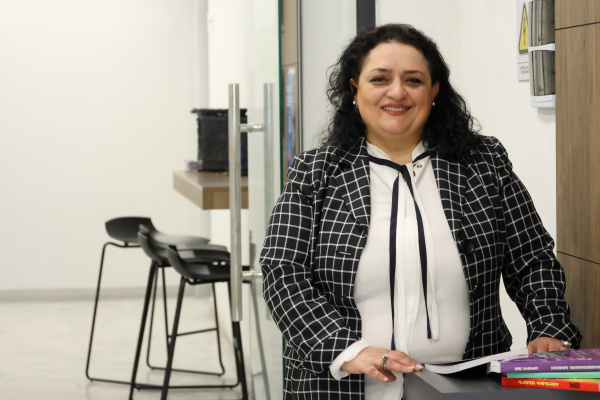April 22, 2025 | 10:53
Education
Research
Academic engagement and its role in enhancing education
When discussing the quality and effectiveness of higher education, it is important to recognize that the level of student engagement plays a crucial role. Lusine Stepanyan, Associate Professor at YSU Faculty of Philosophy and Psychology, is conducting a study aimed at identifying the environmental and personal factors that influence students’ academic engagement and well-being. This research could provide valuable insights for developing student-centered educational models, contributing to young people's personal and professional growth.

The scientific project titled "Study of Environmental and Personal Factors Influencing Students' Academic Engagement and Well-Being," presented by Lusine Stepanyan, was guaranteed funding as part of the "Scientific Effectiveness Promotion Grant Program-2025" competition, announced by the Ministry of Education, Science, Culture and Sports of the Republic of Armenia.
We spoke with Associate Professor Lusine Stepanyan about the objectives, rationale, and potential applications of her research within the framework of the scientific project.
- Ms. Stepanyan, why is it important to study the academic engagement and well-being of students in today’s world?
- The rapid transformations in modern society impact all spheres of activity and life, including education, which directly affects students. Information revolutions occurring in our contemporary reality have a positive impact; however, the negative consequences are also evident, such as decreased motivation, uncertainty about the future, and changes in attitudes toward academic education. Research shows that academic engagement affects students' professional identity, which, in turn, influences their professional development and establishment. Academic engagement is also linked to students’ well-being and psychological health, facilitating their adjustment to the professional educational system. According to the well-known Dutch psychologist W. Schaufeli, academic engagement is seen as a component of the 'self' concept, reflecting the degree of identification with the activities undertaken, which significantly impacts self-acceptance, self-esteem, and personal growth.
Nowadays, it is essential to understand what fosters or hinders student engagement, as it provides an opportunity for educational systems to create student-centered environments and educational models that will most effectively contribute to students’ personal and professional development, the revelation of their potential, and the formation of trust and self-confidence. Academic engagement also contributes to the development of self-regulation, planning skills, and independence. Ultimately, such developments have a broader impact on the country's economic growth. The more socially and psychologically stable professionals there are, the more stable society will be as a whole.
Through studying the academic engagement of students, it is possible to develop educational interventions at both the university level and in educational policy. Such research does not remain purely theoretical but directly serves students' well-being.
- What is the significance of the scientific project?

- The project aims to study the factors that influence students’ academic engagement—these include environmental, specific features of educational organization, student–lecturer relationships, digital technologies, as well as personal psychological and socio-psychological factors such as self-esteem, level of trust, adaptive potential, anxiety, and overall well-being. In order to examine these factors, it is first necessary to define the term academic engagement, establish its evaluation criteria and indicators, and develop a model of academic engagement. This model could serve as a basis for reviewing and transforming the organization of the educational process in universities.
- In your opinion, what tangible outcomes or applicable conclusions could emerge from this research?
- Potential outcomes include the development of a theoretical model that reflects the interconnection between engagement and well-being, concrete intervention proposals aimed at improving the educational environment, and policy recommendations to strengthen student-centered approaches—including, potentially, the establishment of supportive laboratories.
- Could you name the key factors that should be taken into account during the study of this topic?
- It is essential to consider the student’s socio-economic status, family support, the quality of the academic environment, the attitude of lecturers, institutional policies, and the development of extracurricular structures—such as cultural, sports, civic, volunteer, and scientific initiatives—as well as the student’s individual psychological traits, including motivation, self-regulation, and emotional stability.
- Which components of the academic environment have the greatest impact on student well-being?
- For example, respectful and supportive attitudes from lecturers, a rational distribution of academic workload, ensuring that the student's voice is heard, accessible counseling and support services, as well as opportunities for student self-expression and personal development. Education should not be a mere formality; the student must recognize its value. Education becomes an internal need when the student understands, on the one hand, the role of education in achieving freedom, independence, and a dignified life, and on the other hand, the role of multifaceted institutional support in shaping adaptation, loyalty, and well-being within the university.
- Can we assume that lecturers’ attitudes and the organization of the academic process play a significant role?
- Absolutely. lecturers’ approaches are crucial in shaping the level of student engagement. Human-centered teaching models contribute much more to engagement than approaches focused solely on the transmission of information. At the same time, it is equally important for the student to be prepared and open to receiving that support, to be willing to grow, and to value their education.
- What methodological approaches or methods will be used to effectively explore these issues?
- We will employ a mixed-methods approach—quantitative (such as questionnaires and tests to measure engagement, well-being, and mental resilience, as well as studies of psychophysiological characteristics) and qualitative methods, including interviews, focus groups, observations, and document analysis. This will ensure a comprehensive understanding.

- What psychological characteristics define the profile of today’s student that may be significant for this research?
- Contemporary university students in Armenia often have high expectations but face socio-economic uncertainty, which creates a combination of decreased motivation and emotional tension. The level of family support and the dominance of an external locus of control also influence the degree of engagement. There is a noticeable desire for quick results, which highlights the need for more flexible and application-oriented educational models. In this context, it becomes crucial to foster the formation of professional identity and to enrich the content of education in order to stimulate engagement and stability.
- What changes have you observed among students in terms of engagement and psychological resilience?
- We are observing polarized trends among students—ranging from high levels of engagement to complete disengagement, from strong loyalty to marked instability. Today’s student has a need for individualized attention, to feel valued, to express themselves, and to be acknowledged. There is also a strong desire for quick results, which is why, in this critical phase of educational transformation, comprehensive studies are especially important.
- Is our educational system prepared to respond to changes aimed at improving student well-being?
- The university system is much more flexible, and I believe it is precisely from higher education that the formation of the educational system we all aspire to can begin. General education is undoubtedly important, but the individuals who implement general education are shaped in universities—therefore, the role of universities in transforming and developing education in Armenia cannot be overstated. At present, the educational system is only partially ready to respond to all the aforementioned changes. Taking Yerevan State University as an example, I can say that continuous efforts are underway to improve the academic environment and the organization of education. There has been progress in establishing psychological services and promoting student-centered approaches. However, what is still lacking is a systematic and stable strategy that will apply to all educational institutions, regardless of their resources.
- How can the results of the research be applied in universities to create a more student-centered environment?
- The results of the research can serve as a valuable tool in several areas: revising curricula, improving student support policies, training lecturers, expanding psychological services, and designing initiatives that encourage student participation. They can also help strengthen mentoring and volunteer programs, raise admission standards, and create better career opportunities and prospects for top-performing students.

